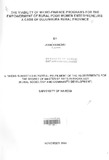| dc.description.abstract | This studyaimed at investigating the issue of how far micro-finance programs are viable for the empowerment of rural poor women entrepreneurs in the context of Bujumbura rural province, in Burundi. The main purpose wasto look at the role micro-finance programs play in bringing about women's socia-economic empowerment in the area. The study had two specific objectives: (1) to measure how far micro-finance programs are reaching the rural poor women entrepreneurs; (2) to determine the material and non-material benefits of micro finance programs for rural poor women entrepreneurs at both the individual and household levels.
The empirical and theoretical literature pointed out that micro-finance programs do not reach the poorest of the poor. Wood et al. (1997). According to Cheston et al. (2002), the programs lead to women's economic empowerment, increased self-esteem, and other forms of empowerment. However, these programs alone should not be taken to be a panacea for the empowerment of rural poor women entrepreneurs. Hulme, (1997).
From the literature review, two hypotheses were formulated: (1) creditworthiness of rural poor women entrepreneurs influences their chances of obtaining credit and other micro-finance service; (2) rural women entrepreneurs who have obtained credit and other micro-finance services improve performance of their micro enterprises.To determine the relationship between variables, Pearson's Chi-square was used and the level of significanceof 0.05 was used to accept or reject hypotheses.
The research methodology included interview schedule and questionnaire. The collected data was interpreted usingboth descriptive and inferential statistics. The sample size was made up of 65 women drawn randomly
'''''' ...
from the population of 110 women entrepreneurs of Mubon'&SUO..l.ocation, who had received a loan from a
MFI. ~-
The results of the study were: Firstly, that the chances of obtaining credit are influenced by the type of business the client is involved in, her level of education, and prior experience in business; secondly, that age, and marital status seem not to have an impact on the chances of obtaining credit or business training; and thirdly, that the loan, coupled with other micro-finance services, lead to increase in income, stock, number of
employees, equipment and tools as well as self-esteem and self-reliance.
1
The findings are in agreement with the Conventional Model of the Impact Chain model that micro-finance programs do have a positive impact on clients when outside factors are taken into consideration. The findings are also in agreement with the findings of other scholars as indicated by literature (see paragraph three).
The conclusion of the study indicates that though the micro-finance programs are selective and not a panacea for the empowerment of rural poor women entrepreneurs, they have the viability to empower them, especially in an enabling environment.
The study recommends that the MFI takes into consideration needs and level of education of clients, strong monitoring and evaluation systems, and business training; clear policies, rules and regulations. There should be also further research on negative impacts on micro-finance programs, how far they can lead to macro businesses, and the age and gender dynamics in relation to these programs. | en |

